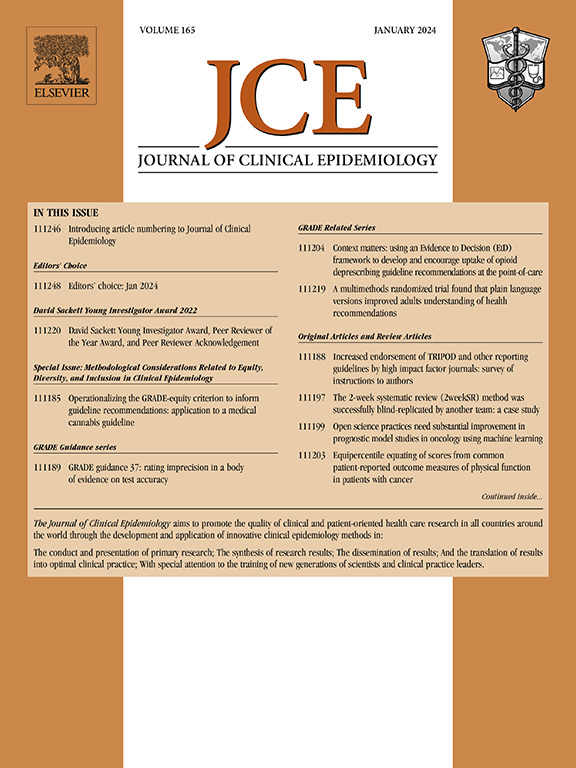Peer review reports of randomized controlled trials in oncology can be short and superficial
IF 5.2
2区 医学
Q1 HEALTH CARE SCIENCES & SERVICES
引用次数: 0
Abstract
Objectives
To evaluate the quality of open peer review reports published alongside articles of randomized controlled trials (RCTs) in oncology.
Methods
We searched and sampled from completed parallel RCT articles published in 2021 in 62 BioMed Central journals operating open peer review and evaluated their first-round peer review report. We assessed and described the peer review report content, clarity, and completeness and explored whether reviewers commented on the manuscript's importance, robustness, interpretation, discussion of results, and RCT reporting. Two investigators evaluated the review reports independently, with conflict resolution involving a third author.
Results
We sampled 26 RCTs and evaluated their 59 first peer review reports. Median word count was 276 (range = 0–1047). Only 11 reports were constructive (19%), suggesting solutions for the problems noted. Of reviewers commenting on the manuscript's methods section (n = 46/59, 78%), 74% (n = 34/46) addressed the suitability of the methodology. Fewer commented on the adequacy of conclusions (n = 15/59; 25%) or the applicability of results (n = 5/59; 9%), or whether study limitations had been acknowledged by authors (n = 11/59; 18%). Only four (7%) commented on open research practices, including deviations from protocols, completeness of reporting, and sharing of data and materials.
Conclusion
Peer review reports of published RCTs in oncology were short, superficial, and rarely constructive. Although there is indication that reviewers commented on study methodology, little attention was paid to study conclusions, deviation from study protocols, completeness of reporting, or data availability. Such review reports would be of limited value to authors for improving their trial study manuscripts, or to editors in deciding on manuscript publication.
Plain Language Summary
Clinical trials are research studies that test whether a treatment or action works to help prevent or treat a disease. The results from these studies are important because they help doctors and policy makers decide what care is best for patients. Before the results from a clinical trial are published, other experts, sometimes including members of the public, carefully check the study to make sure it was conducted properly and that the results are trustworthy. This checking process is called “peer review”. Reviewers look at things like how the study was carried out, whether the results make sense, and if the conclusions are fair. In our project, we looked at how well this peer review process worked in a selection of medical journals that make their review reports public. We read the reviews for 26 published trials to see what the reviewers said. We found that most of the review reports were very short and did not provide much detail to help the journal editors decide if the study should be published. Some reviews were only one sentence long. Many reviewers did not comment much on how the study was analyzed, and very few said whether the study conclusions were reasonable. Although peer review is supposed to help make sure research is reliable, we found that sometimes the reviews are too brief to be very helpful.
肿瘤学随机对照试验的同行评议报告可能简短而肤浅。
目的:评价与肿瘤学随机对照试验(rct)文章一起发表的公开同行评议报告的质量。方法:我们从2021年发表在62种开放同行评议的BioMed Central期刊上的已完成的平行RCT文章中进行检索和抽样,并对其第一轮同行评议报告进行评估。我们评估和描述了同行评审报告的内容、清晰度和完整性,并探讨了审稿人是否对手稿的重要性、稳健性、解释、结果讨论和RCT报告进行了评论。两名调查人员独立评估了综述报告,冲突的解决涉及第三作者。结果:我们选取了26项随机对照试验,并评估了它们的59份首次同行评议报告。中位数字数为276(范围=0-1047)。只有11份报告是建设性的(19%),为所指出的问题提出了解决方案。在对论文方法部分进行评论的审稿人中(n=46/59,78%), 74% (n=34/46)的审稿人提到了方法的适用性。较少评论结论的充分性(n=15/59;25%)或结果的适用性(n=5/59;9%),或者作者是否承认研究的局限性(n=11/59;18%)。只有4%(7%)评论了开放研究实践,包括对协议的偏离、报告的完整性以及数据和材料的共享。结论:已发表的肿瘤学随机对照试验的同行评议报告简短、肤浅,而且很少有建设性。虽然有迹象表明审稿人对研究方法进行了评论,但很少关注研究结论、与研究方案的偏差、报告的完整性或数据的可用性。这样的综述报告对作者改进其试验研究手稿的价值有限,或对编辑决定手稿发表的价值有限。
本文章由计算机程序翻译,如有差异,请以英文原文为准。
求助全文
约1分钟内获得全文
求助全文
来源期刊

Journal of Clinical Epidemiology
医学-公共卫生、环境卫生与职业卫生
CiteScore
12.00
自引率
6.90%
发文量
320
审稿时长
44 days
期刊介绍:
The Journal of Clinical Epidemiology strives to enhance the quality of clinical and patient-oriented healthcare research by advancing and applying innovative methods in conducting, presenting, synthesizing, disseminating, and translating research results into optimal clinical practice. Special emphasis is placed on training new generations of scientists and clinical practice leaders.
 求助内容:
求助内容: 应助结果提醒方式:
应助结果提醒方式:


